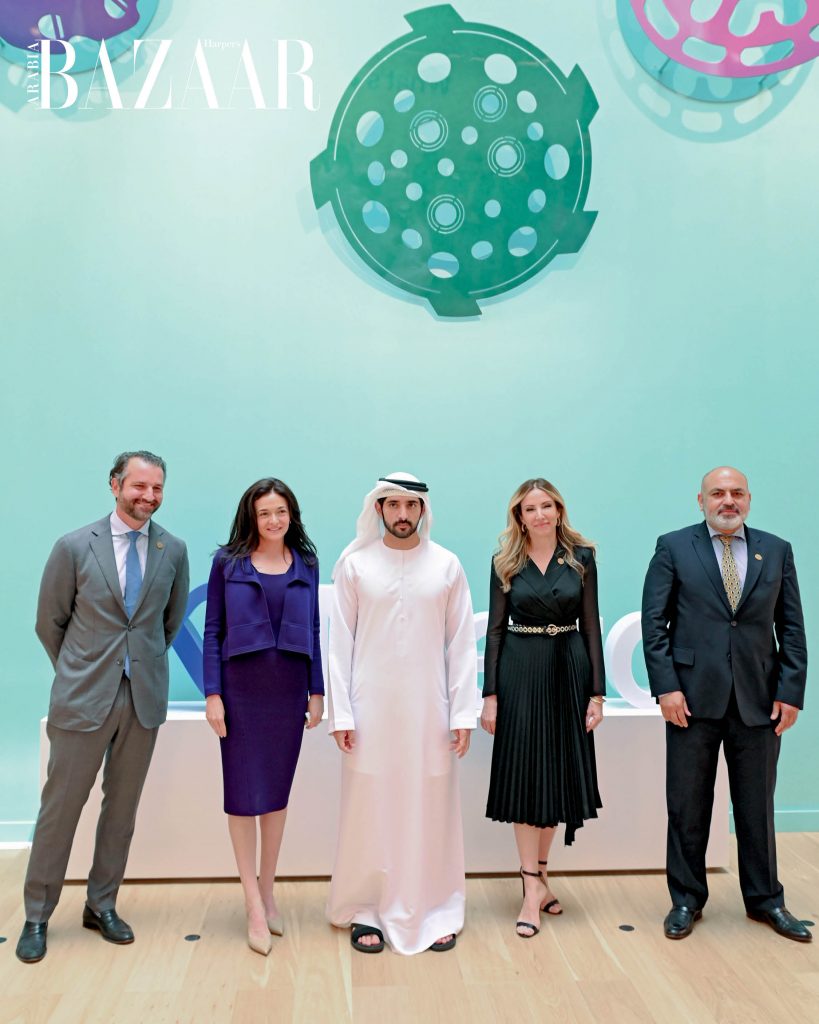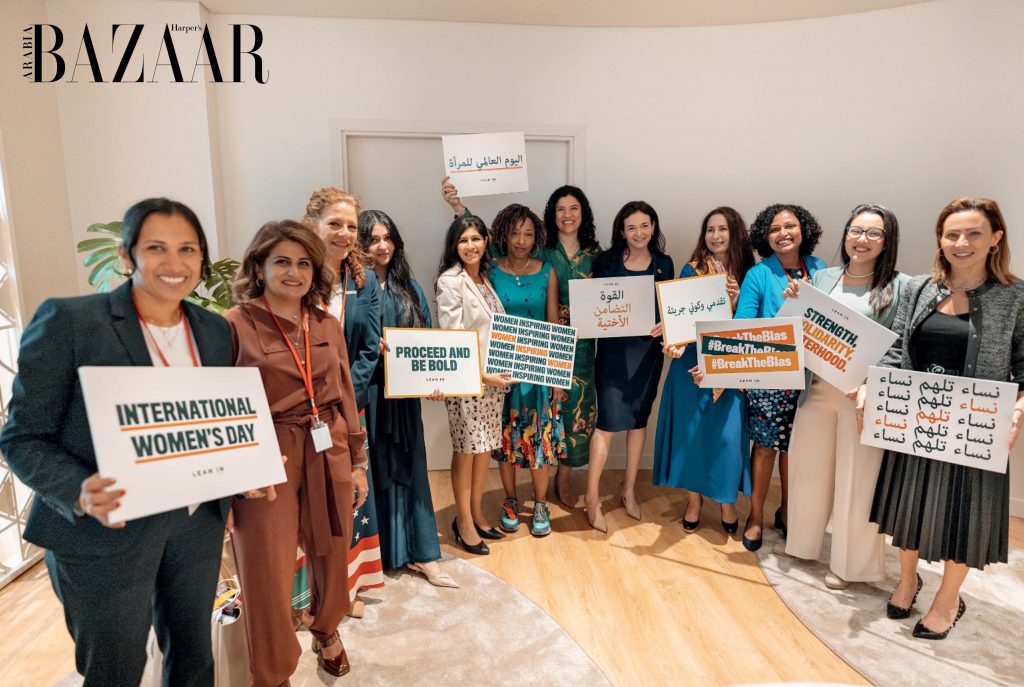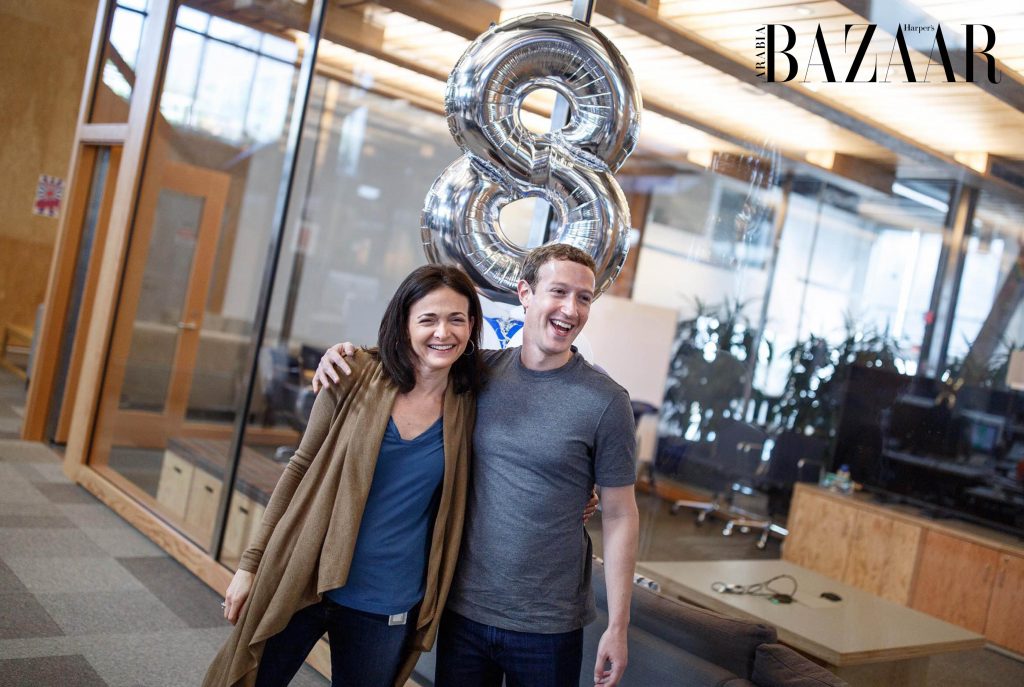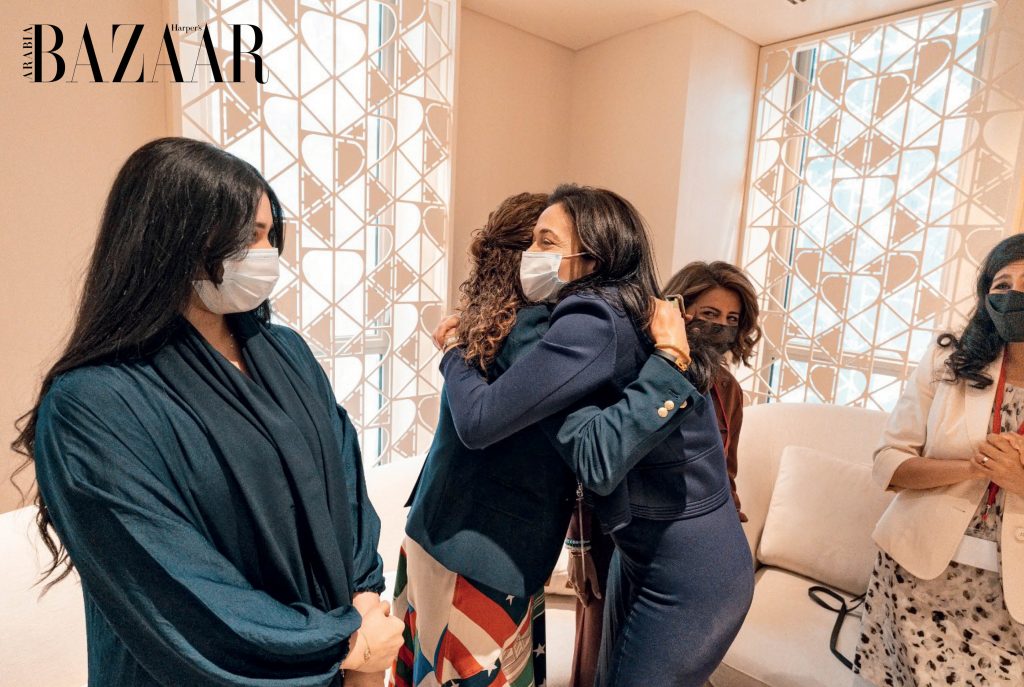
Exclusive: Sheryl Sandberg On Gender Equality, Women In The Metaverse And Barrier Breaking
Who’s protecting women’s rights in the metaverse? Only Sheryl Sandberg has the answer. Harper’s Bazaar Arabia has an exclusive conversation with Meta’s Chief Operating Officer to find out more
March 8th is International Women’s Day. A day to celebrate the amazing work and strides being made by women all over the world, both in the workplace and at home. It’s a day when shout-outs to inspiring women flood social media, conferences are held about redefining the future of women, and women and girls connect with one another around the globe. But this year, there was only one woman that I was interested in connecting with: Sheryl Sandberg.

The Chief Operating Officer of Meta (formerly known as Facebook) had decided that her first international trip post-Covid would be to the United Arab Emirates. She had come with her family and fiancé, Tom Bernthal, for a whirlwind tour of the country and she specifically timed it so she would be in town on March 8th.
Her agenda was packed. On that symbolic day, which was also the day I got to shadow her, Sheryl inaugurated Meta’s new HQ in Dubai alongside Crown Prince HH Sheikh Hamdan bin Mohammed bin Rashid Al Maktoum, spoke at the #BreaktheBias forum hosted by the Women’s Pavilion at Expo 2020, and met with groups of local content creators to discuss the metaverse. She also sat down with members of a Dubai-based Lean In Circles group, part of a network of Circles around the world created through Sheryl’s nonprofit organisation, Lean In, named after her New York Times bestselling book released in 2013. Harnessing the power of women coming together, these Circles are geared around bringing small groups of women together to support each other in achieving their goals.

So before even speaking with her, Sheryl’s dynamic energy, drive and desire to learn and educate were already apparent in her actions, as an influential role model for women’s empowerment and a force for change. Throughout the day, she always had time for a selfie with a fan, or a quick word of advice for someone trying to come to a decision. Even the way she interacted with her staff, pointed to someone looking to elevate and encourage those around her.
But while she is one of Silicon Valley’s most successful women, who has also put a spotlight on gender bias in the workplace, she has never seen herself as a barrier-breaker. “No, not at all,” she exclaims when the idea is floated. “I grew up in Miami, Florida, I went to a big public high school. I was a smart girl, and geeky, which I’m proud of in retrospect, but [it] was harder in high school. And I knew I cared a lot about learning. But I absolutely never thought I’d go into tech at all. I thought I would work in nonprofits or in government because I only wanted to do things that were doing good for the world. I don’t think of myself as a barrier-breaker,” she says. Given her position of power in the business world, however, she admits that she does “feel a real responsibility to bring more women up behind me, that’s for sure.”

Sheryl has her work cut out for her. The executive has painfully watched as, over the past two and a half years, all of the advancements she and her fellow female leaders have made slide backwards in the wake of Covid. The pandemic disproportionately affected women, as it substantially increased the need for hands-on care in the home, with women leaving their jobs in droves to look after their families. Alarm bells were raised in a recent McKinsey report on gender equality that stated that if current employment trends continue, global GDP growth is expected to decrease by as much as $1 trillion dollars by 2030.
If you want to see Sheryl get fired up, just ask her about the impact the pandemic has had on women. “Look, any crisis always hits the people who are most vulnerable. And let’s be honest, the people who are the most vulnerable are women and children. Covid has been an economic crisis, a health crisis, and an absolute crisis for gender equality,” she confirms. “But what it’s exposing is something that was true before, which is the uneven nature of who does the caregiving. So, women caregive. Women take care of children. Women take care of parents, including their husband’s parents, while women are also working outside the home.”
The self-proclaimed nerd that she is, Sheryl has already seen the numbers and can extrapolate out the ripple effect that Covid will have on women around the globe. “In this region [the Arab States], women’s workforce participation has decreased by 4.1 per cent. Men’s has decreased just 1.8 per cent. Women’s labour force participation just hit where it was in 1988 in the United States. 1988! We’ve just gone back three and a half decades,” she exclaims.

But for Sheryl, part of the fundamental solution to the issue is the same one that was a central theme in her book Lean In. “What we need to do now is the same things we needed to do before. We need to support women in the workplace. We need to make sure women can get paid equally – because why work if you’re not going to get paid the same? We’re going to need to make sure women’s leadership is embraced. And we need caregiving to be split,” she says in a rapid-fire manner, as if ticking off a gender-equality checklist she’s been carrying around in her back pocket for decades. A checklist that, unfortunately, is still missing a lot of tick marks.
But if anyone could challenge that, it’s probably Sheryl. The eldest child of Joel Sandberg, an ophthalmologist, and Adele Sandberg, a community leader, Sheryl was an overachiever from the start. She graduated with a 4.6 GPA from high school and went on to receive a BA summa cum laude from Harvard University and an MBA with the highest distinction from Harvard Business School.

She started her career working as a research assistant to former World Bank chief economist Larry Summers, and later became his Chief of Staff at the U.S. Treasury Department when he was appointed Deputy Secretary of Treasury during the Clinton administration. In 2001, she moved to a little tech start-up called Google, coming on board as its Vice President of Global Online Sales and Operations. There she helped the company expand its sales force into the thousands. Then in 2008, she joined Meta (Facebook at that time) as its COO, heading up the company’s business operations and global expansion. Today, 14 years later, the multi-billionaire executive and philanthropist is the right hand of Meta’s founder, Mark Zuckerberg.

Clearly, Sheryl has every intention of using her professional standing to push for parity in the workplace. And while the pandemic has been destructive on so many levels, it has also shown the world that we can come together and make collective transformations if we put our minds to it. But perhaps systemic change will have to start from the ground-up. The goal being that from the moment a woman is born, she will experience the world as a place filled with opportunities and not limitations. That is what Sheryl wants for her own daughter and everyone else’s, too.
“You know, it’s interesting. We tell boys at a young age that they are really good at [maths]. And we tell girls that they’re better at reading and writing. And then lo and behold, the boys are better at maths and the girls are better [at reading and writing],” she recounts. Gaming, Sheryl adds, is the perfect present-day example of how women and girls are still being overlooked. It is a critical entry point for children to become curious about tech and computer coding, and yet, “It’s an industry by men building games for boys, for men. So, there’s not a natural path there [for girls]. And we have to change those stereotypes. We really do,” says the COO of one of the biggest tech companies in the world.

Speaking of which, what about the metaverse? What role will this new virtual realm play in gender equality? Right off the bat, being able to choose any sort of avatar to represent yourself in the digital space is already one step in the right direction. But what Sheryl is looking forward to is seeing what happens when early adopters of this new technology come in contact with those who are reticent about the metaverse.
“The truth is, every technology that’s ever been invented has had some fantastic usage and had some bad usage,” she says. “You know, cars are wonderful things. They get us to places faster. They also kill people. So, laws like speed limits, and rules [of the road] are really important. I think the metaverse is the same thing. There are people who are so excited. And there are people who are scared, and we need both. We need the people who are excited to build [the metaverse] and we need the people who are nervous, so that as we build, [we] prevent the harm.”

Sheryl herself is also in the perfect position to help prevent harm, both in the metaverse but also at Meta. And that’s because, as the Hamilton song goes, she is In The Room Where It Happens. She is a part of the critical discussions being made at Meta that will have a fundamental impact both within the company and throughout the online universe.
It’s a role that her boss, Mark, thinks Sheryl is thoroughly suited for. In a recent podcast interview on The Tim Ferriss Show, the internet entrepreneur said that it was Sheryl’s combination of IQ and EQ that made her such a great leader. “If you get someone who’s great at strategy or great at product and they’re not a great manager, that’s great. If you can have someone who’s excellent at one of those things, you hire them every day. I think it’s just exceptionally rare to find people who spike in both of those areas,” said Mark on the show.

For her part, Sheryl is determined to make sure that more women want to take up leadership roles. This can be done when we as a society take away stumbling blocks that put into question a woman’s ability to work and raise a family and also make it harder to do both by not providing affordable childcare options. Or by having a partner who is willing to take up their equal share of household duties. That we change the tendency to discourage female ambition and drive while encouraging it in men.
“As men get more powerful, they are better liked. As women get more powerful, they are less liked. Girls as young as junior high start acting dumber to attract boyfriends. Boys don’t act dumber to attract girlfriends. Because we want boys who are smart. That’s something you look up to. Now, I hope that doesn’t happen everywhere. But these are the stereotypes we need to face. Because it turns out being ‘in the room’ is really interesting,” says Sheryl.

But beyond creating her Lean In organisation to empower women, being an advocate for gender equality and her day job of helping to run one of the most powerful companies in the world, Sheryl is leading by example in another fundamental way. She is showing women that success in the workplace doesn’t mean having to adhere to the norms and codes set up by men. The best example of this is how open she has been about her own personal struggles and heartache.
In 2015, Sheryl’s husband, Dave Goldberg, died suddenly. In a move that shocked many, she posted a long and heartfelt message about her grief on her Facebook page. This is not something that a person in her position – let’s be honest – ever does. But Sheryl’s hope was that by being open and upfront about what she was going through, it would help others to learn how to cope with their loss. As I write this, that post has garnered 77,000 comments, 395,000 shares and 904,000 thumbs-ups. The reaction was overwhelming and it motivated Sheryl to co-write another New York Times best-selling book, Option B, with the psychologist Adam Grant, which focuses on how to build resilience and pick yourself up after dealing with adversity.

That sort of transparency is also why Sheryl took to Facebook again in 2020 to announce her engagement to Tom, the founder and CEO of the Los Angeles-based strategic consulting agency Kelton Global. “I didn’t think of it as a public document. [It] really went probably more viral than anything else I’ve ever done,” says Sheryl about the message she posted about Dave’s passing. “So having lived a tragedy then finding love again gave so many people hope,” she adds with a smile. “Once the tragedy was so public, making the romance and, you know, the happier ending public – I thought was almost a responsibility.”
And while her engagement is probably one of her happiest personal memories, before she set out for her next March 8th meeting, I ask Sheryl a question that stumps her for a minute: from across her career, which one moment would she want to live over again? “Oh my God, no one’s ever asked me that!” she says.

After mulling it over for a while, her answer underlines just how much lifting up other women has become the cornerstone of her life’s work. “We hired an incredible woman named Nicola Mendelsohn, and I had this meeting with her where I was like, ‘you’re gonna come to Facebook and you’re gonna do an amazing job.’ Watching how she has progressed – now she runs global sales for us – I’d like to go back and relive that.”
And with that final thought, Sheryl was out the door and onto her next meeting. Ready to take on whatever the world has to offer. Determined to make sure that, in the not-too-distant future, it will be offered to a lot more women.
Lead image by Jill Greenberg.
From Harper’s Bazaar Arabia’s May 2022 issue.
